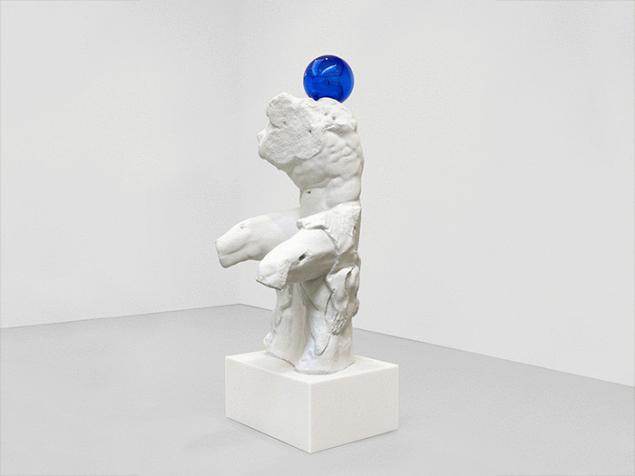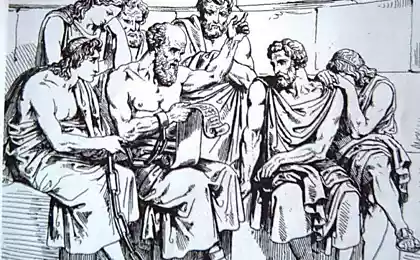602
The power of indifference: how the philosophy of stoicism helps to live and work
Eighty five million six hundred two thousand six hundred nine
© Jedd Coone
Today, the philosophy of stoicism has acquired in the eyes of many not very bright shades. The Stoics are perceived to be dark, harsh, who, with clenched teeth, ready to endure all the troubles of life, rather than trying to overcome them. However, the essence of the doctrine is not in it. Stoicism is about how difficult trials to see the possibilities of how to be happy even in the most hopeless situation. This article Larry Wallace, published in Aeon.
We often distort philosophy. We change its shape only on the basis of blurring, make it cartoon, like a cartoonist, especially exaggerating the wrong features. So Buddhism in the minds of many becomes a doctrine of passivity and even laziness, and existentialism has become synonymous with apathy and meaningless despair. Something similar happened with stoicism. It is perceived (if at all remember it) as a philosophy of grim endurance, patience and continuation, but not of overcoming different life of sufferings and troubles.
Not surprisingly, this philosophy has lost its popularity. It is not surprising that in Western culture, the wise stoick was never as popular as the Zen master. Even though stoicism is far more accessible, he not only has an exotic mystique of Eastern practices, but is considered a philosophy that just breaks people, even when he strongly indifferent. This understanding ignores the constant desire to overcome and calm the mind that the Stoics are advocating.
In addition, this does not include the gratitude. It is also a piece of peace, because gratitude makes peace possible. Stoicism to a greater degree than any other doctrine is a philosophy of gratitude. Moreover, gratitude is so strong that you can endure anything. Philosophers, yearned for higher psychological liberation, often forgot about their belonging to the community, which includes including the Stoics. "You want to live "according to nature"?" — mocks the Stoics to Nietzsche in the book "beyond good and evil" (1886):
"O noble Stoics, what fraud of words! Imagine a being like nature, — immensely prodigal, immensely indifferent, without intentions and consideration, without mercy and justice, fertile and barren, and unstable at the same time, imagine the indifference in the form of government, how could you live according to this indifference? To live — isn't just wanting to be something other than nature? Isn't life is a desire to evaluate, to prefer, to be unfair, to be restricted to be different from the rest? If we assume that your imperative "live according to nature" means in essence the same as "living according to life", then how would you do it? Why create a principle that you yourself are themselves and what you should be?"
Accusations of stoicism is such a seductive in its clarity and energy and therefore effective, but it is absolutely incompetent. That's why you feel such disappointment when I see how Nietzsche gets away from the path of prudence in the following two paragraphs, and accuses the Stoics in an attempt to "impose" their "moral nature" of failing to a different view (in nature) because of the "arrogant of hope" that nature can "tyrannize" as well as the Stoics ironiziruyut themselves. Then he accuses all of philosophy is that it is a "tyrannical instinct", "the spiritual will to power" to "creation" (all of this is obvious psychological projection, given that Nietzsche was obsessed with the idea of psychological superiority).
Indifference really gives power. If used in the right situations, if you consciously adopt a certain attitude, the indifference not only makes such a life possible, but also helps you lead a more free, open and unusual way of life. Joy and sorrow, and other emotions are not going anywhere, but you will be able to moderate, and they will be torment.
If the explanation that there is stoicism, it is not always possible to turn to the philosophers, then to whom? For starters, you can look at the definition of the word "stoic" in the Urban Dictionary — crowdsourcing online dictionary for English slang:
Stoic — a person who does not bother about any nonsense that happens in this world, which is steamed most people. The Stoics have emotions, but only to really important things.
Example: a group of teenagers sitting on the porch. Passes by stoick.
One of the company: Hey, you jerk, and ghoul, are you a pervert! Stoick: Good, you're in luck!
What is going on.
It is interesting that the author uses in this anecdote the word "porch" (porch), because the word "stoicism" comes from the Greek word "stoa" — and this is just the Greek name for the structure that we refer to today as a porch (portico of approx. ed.). The ancient Stoics met in the galleries, spent time there and talked about education and all sorts of other things. The Greek philosopher Zeno is the founder of the school, and the Roman Emperor Marcus Aurelius, the most famous practitioner, while the Roman politician Seneca was perhaps the most eloquent and interesting representative of this doctrine. However, the real hero of stoicism most of the Stoics recognize the Greek philosopher.
He was a slave that perfectly reinforces his teaching. Such conviction other Stoics cannot boast, despite all the transferred of life's difficulties. He was talking to his disciples, and then they recorded his words. Today is the only thing that survived from the teachings of Epictetus. His speech is contained in two short works "the Guide" and "Conversations". Among the direct disciples of Epictetus was Marcus Aurelius (another stoic philosopher who did not anticipate that it will ever have to read. His book "To himself" written exclusively for myself, that kind of personal leadership).
"The advice of the Stoics: 9 ways to use philosophy in everyday life"Among "indirect" disciples of Epictetus — a whole galaxy of great people who are outstanding in all areas. One of them is a former Admiral of the US Navy, James Stockdale. During the Vietnam war he was imprisoned for 7 years, he had broken bones, he was starving, sitting in solitary confinement and endured various other hardships and trials. Its psychological support at that time was the teachings of Epictetus, whom he met after College, when he was in the Navy. In parallel, he studied philosophy at Stanford University. In Vietnam he always addressed the ideas of stoicism and not forget about them even in the most terrible moments. Especially in such moments. He understood the importance of these lessons and learned to apply them in practice better than anyone else.
Stockdale wrote a lot about Epictetus, mentioned it in speeches, memoirs, writings. But if you do not want to hammer head (which is what this is trying to avoid the stoic), the best of all — his speech in 1993 at the Royal College of London, published under the title "Courage under fire: testing Epictetus's doctrines in a laboratory of human behavior" (1993). The subtitle is important here. Once He compared the lecture hall of the philosopher with the hospital from which the student must leave feeling a little pain. "If the lectures of Epictetus is the hospital, writes Stockdale — that my prison was a laboratory. Laboratory of human behavior. I decided to test the tenets of Epictetus, for example, the real-life challenges that were happening in my lab. As you can see, he triumphantly withstood the test."
Stockdale has rejected the false optimism that preaches Christianity, because he knew from his own observations, that about the hope that was driving in jail of your mind. The Stoics themselves believed in the gods, but the one who does not accept religious beliefs, may interpret stoicism as well as Buddhism, if you can't believe in karma and reincarnation.
If you get rid of all the excess "stuff", it all ultimately comes down to choice. The choice is really all we have, and the rest should not even think of. "People invincible?" — once asked Epictetus, and then he said, "Those who do not care about anything that lies outside of his choice." Any misfortune that lies beyond choice, should be seen as an opportunity to strengthen our resolve, not to be an excuse for weakness. This is truly one of the world's greatest principles of life is the desire to turn trouble into an opportunity. It is partly praised Seneca when he described what he'd say to someone whose spirit has never resigned and never been tested: "you Poor, miserable because they were never unhappy. You lived a life without encountering the enemy; and no one will ever know what you were capable of, even yourself." We do ourselves a huge favor when we see the trouble the opportunity to make such a discovery and this discovery is to find and get even more.
Another great life the stoic principle is reflected in the book of William Irvine's "Guide to the good life: the ancient art of stoic joy" (2009). The principle is called "negative visualization." According to the Stoics, constantly thinking about the worst that can happen, we're immune to the dangers that are fraught with excessive positive thinking, the conviction that a realistic view of the world leads only to despair. Just imagining the bad, we really can appreciate a good. You will not experience gratitude, if you will all be taken for granted. It is this gratitude makes us happy to make concessions when everyone in the world already out of control. How could be such a huge misunderstanding in such a supremely intuitive philosophy? How could we forget that dark narrow passageway actually leads to excellence?

In these principles it is possible to learn standard cognitive-behavioral psychotherapy (CBT). In fact, stoicism was defined as a kind of proto-cognitive-behavioral therapy. American psychologist albert Ellis, developed in 1955, the first form of CBT known as rational-emotive therapy, read the works of the Stoics in his youth and at the time prescribed to his patients Epictetus's Maxim: "Man disturb not the things themselves, but their own opinion about these things." "In a nutshell, it essentially is a cognitive model of emotions," says Donald Robertson — psychotherapist, who in 2010 wrote the book on cognitive behavioral therapy, "the Philosophy of stoicism as rational and cognitive psychotherapy".
Obviously, because of this simplicity and accessibility stoicism will never understand those who are fond of abstract and esoteric philosophies. In the novel "a Man in full growth" (1988) Tom Wolfe gives a stoic attitudes of semi-literate prisoner, and he does with surprising credibility. Monologue Conrad Hensley may seem lofty, but impossible to doubt lurking behind the feelings. When Conrad asked stoick if he is, he replied: "I only read about it, but I'd like to see anyone of these people today were close to him could come, how came the disciples to Epictetus. Today people think that the Stoics are people, you know, are people who, with clenched teeth, endure the pain and suffering. But really they're just calm and confident in the face of every adversity".
This leads one to ask, but what were the hardships? We have already mentioned that Epictetus was a slave, in front of his name you can tick. Opposite Seneca, too, despite the opinion of many dissenters. The life of Seneca, despite occasional opportunity to enjoy all earthly blessings, was very difficult: he was ill with tuberculosis, was in exile under the yoke of a brutal dictator and murderer. Seneca himself said that no one saying of the wise to poverty. Only Greek cynic would try to deny it.
In addition, Seneca would be the first to say, once I wrote someone in one of his letters: "I am not so shameless to try to heal their comrades when he is sick. However, I discuss problems that concern us both, and I share with you my cure as if we lay together in the hospital." Marcus Aurelius was also in the "hospital". Endowed with the power of the Emperor and enjoys all the privileges of this provision, he also endured all the attendant difficulties and strikes, and even beyond that. I would not be able to speak on this subject better than Irvine in his book "Guide to the good life." So I am not going to split hairs and I quote:
"He was sick, possibly an ulcer. His family life was full of misfortunes: his wife apparently was unfaithful to him, out of the 14 children she bore him, only six survived. In addition, the control of the Empire, struck their blows. During his reign the borders were many uprisings, and mark often went personally to monitor their suppression. His own appointees, especially Avicii Cassius, Governor of Syria, rebelled against him. His subordinates behaved arrogantly and contemptuously towards him, and the audacity he endured with imperturbable temper. Citizens used to poke fun at him, and they were not punished for it. During his reign the Empire was also struck by plague, famine, natural disasters, particularly the earthquake in Smyrna".
Always being the strategist, mark has applied a reliable technique in the struggle with all the difficulties that filled his life. At the beginning of each day he told himself: "I see an annoying, ungrateful, violent, treacherous, envious and closed people." He could behave differently and pretend that everything is fine, especially in the days when it was really so, or at least seemed so. But in this case, as he learned to walk and the wind against him, constantly adapting to unpleasant twists of fate? What would happened to him when he changed to the wind?
Source: theoryandpractice.ru
© Jedd Coone
Today, the philosophy of stoicism has acquired in the eyes of many not very bright shades. The Stoics are perceived to be dark, harsh, who, with clenched teeth, ready to endure all the troubles of life, rather than trying to overcome them. However, the essence of the doctrine is not in it. Stoicism is about how difficult trials to see the possibilities of how to be happy even in the most hopeless situation. This article Larry Wallace, published in Aeon.
We often distort philosophy. We change its shape only on the basis of blurring, make it cartoon, like a cartoonist, especially exaggerating the wrong features. So Buddhism in the minds of many becomes a doctrine of passivity and even laziness, and existentialism has become synonymous with apathy and meaningless despair. Something similar happened with stoicism. It is perceived (if at all remember it) as a philosophy of grim endurance, patience and continuation, but not of overcoming different life of sufferings and troubles.
Not surprisingly, this philosophy has lost its popularity. It is not surprising that in Western culture, the wise stoick was never as popular as the Zen master. Even though stoicism is far more accessible, he not only has an exotic mystique of Eastern practices, but is considered a philosophy that just breaks people, even when he strongly indifferent. This understanding ignores the constant desire to overcome and calm the mind that the Stoics are advocating.
In addition, this does not include the gratitude. It is also a piece of peace, because gratitude makes peace possible. Stoicism to a greater degree than any other doctrine is a philosophy of gratitude. Moreover, gratitude is so strong that you can endure anything. Philosophers, yearned for higher psychological liberation, often forgot about their belonging to the community, which includes including the Stoics. "You want to live "according to nature"?" — mocks the Stoics to Nietzsche in the book "beyond good and evil" (1886):
"O noble Stoics, what fraud of words! Imagine a being like nature, — immensely prodigal, immensely indifferent, without intentions and consideration, without mercy and justice, fertile and barren, and unstable at the same time, imagine the indifference in the form of government, how could you live according to this indifference? To live — isn't just wanting to be something other than nature? Isn't life is a desire to evaluate, to prefer, to be unfair, to be restricted to be different from the rest? If we assume that your imperative "live according to nature" means in essence the same as "living according to life", then how would you do it? Why create a principle that you yourself are themselves and what you should be?"
Accusations of stoicism is such a seductive in its clarity and energy and therefore effective, but it is absolutely incompetent. That's why you feel such disappointment when I see how Nietzsche gets away from the path of prudence in the following two paragraphs, and accuses the Stoics in an attempt to "impose" their "moral nature" of failing to a different view (in nature) because of the "arrogant of hope" that nature can "tyrannize" as well as the Stoics ironiziruyut themselves. Then he accuses all of philosophy is that it is a "tyrannical instinct", "the spiritual will to power" to "creation" (all of this is obvious psychological projection, given that Nietzsche was obsessed with the idea of psychological superiority).
Indifference really gives power. If used in the right situations, if you consciously adopt a certain attitude, the indifference not only makes such a life possible, but also helps you lead a more free, open and unusual way of life. Joy and sorrow, and other emotions are not going anywhere, but you will be able to moderate, and they will be torment.
If the explanation that there is stoicism, it is not always possible to turn to the philosophers, then to whom? For starters, you can look at the definition of the word "stoic" in the Urban Dictionary — crowdsourcing online dictionary for English slang:
Stoic — a person who does not bother about any nonsense that happens in this world, which is steamed most people. The Stoics have emotions, but only to really important things.
Example: a group of teenagers sitting on the porch. Passes by stoick.
One of the company: Hey, you jerk, and ghoul, are you a pervert! Stoick: Good, you're in luck!
What is going on.
It is interesting that the author uses in this anecdote the word "porch" (porch), because the word "stoicism" comes from the Greek word "stoa" — and this is just the Greek name for the structure that we refer to today as a porch (portico of approx. ed.). The ancient Stoics met in the galleries, spent time there and talked about education and all sorts of other things. The Greek philosopher Zeno is the founder of the school, and the Roman Emperor Marcus Aurelius, the most famous practitioner, while the Roman politician Seneca was perhaps the most eloquent and interesting representative of this doctrine. However, the real hero of stoicism most of the Stoics recognize the Greek philosopher.
He was a slave that perfectly reinforces his teaching. Such conviction other Stoics cannot boast, despite all the transferred of life's difficulties. He was talking to his disciples, and then they recorded his words. Today is the only thing that survived from the teachings of Epictetus. His speech is contained in two short works "the Guide" and "Conversations". Among the direct disciples of Epictetus was Marcus Aurelius (another stoic philosopher who did not anticipate that it will ever have to read. His book "To himself" written exclusively for myself, that kind of personal leadership).
"The advice of the Stoics: 9 ways to use philosophy in everyday life"Among "indirect" disciples of Epictetus — a whole galaxy of great people who are outstanding in all areas. One of them is a former Admiral of the US Navy, James Stockdale. During the Vietnam war he was imprisoned for 7 years, he had broken bones, he was starving, sitting in solitary confinement and endured various other hardships and trials. Its psychological support at that time was the teachings of Epictetus, whom he met after College, when he was in the Navy. In parallel, he studied philosophy at Stanford University. In Vietnam he always addressed the ideas of stoicism and not forget about them even in the most terrible moments. Especially in such moments. He understood the importance of these lessons and learned to apply them in practice better than anyone else.
Stockdale wrote a lot about Epictetus, mentioned it in speeches, memoirs, writings. But if you do not want to hammer head (which is what this is trying to avoid the stoic), the best of all — his speech in 1993 at the Royal College of London, published under the title "Courage under fire: testing Epictetus's doctrines in a laboratory of human behavior" (1993). The subtitle is important here. Once He compared the lecture hall of the philosopher with the hospital from which the student must leave feeling a little pain. "If the lectures of Epictetus is the hospital, writes Stockdale — that my prison was a laboratory. Laboratory of human behavior. I decided to test the tenets of Epictetus, for example, the real-life challenges that were happening in my lab. As you can see, he triumphantly withstood the test."
Stockdale has rejected the false optimism that preaches Christianity, because he knew from his own observations, that about the hope that was driving in jail of your mind. The Stoics themselves believed in the gods, but the one who does not accept religious beliefs, may interpret stoicism as well as Buddhism, if you can't believe in karma and reincarnation.
If you get rid of all the excess "stuff", it all ultimately comes down to choice. The choice is really all we have, and the rest should not even think of. "People invincible?" — once asked Epictetus, and then he said, "Those who do not care about anything that lies outside of his choice." Any misfortune that lies beyond choice, should be seen as an opportunity to strengthen our resolve, not to be an excuse for weakness. This is truly one of the world's greatest principles of life is the desire to turn trouble into an opportunity. It is partly praised Seneca when he described what he'd say to someone whose spirit has never resigned and never been tested: "you Poor, miserable because they were never unhappy. You lived a life without encountering the enemy; and no one will ever know what you were capable of, even yourself." We do ourselves a huge favor when we see the trouble the opportunity to make such a discovery and this discovery is to find and get even more.
Another great life the stoic principle is reflected in the book of William Irvine's "Guide to the good life: the ancient art of stoic joy" (2009). The principle is called "negative visualization." According to the Stoics, constantly thinking about the worst that can happen, we're immune to the dangers that are fraught with excessive positive thinking, the conviction that a realistic view of the world leads only to despair. Just imagining the bad, we really can appreciate a good. You will not experience gratitude, if you will all be taken for granted. It is this gratitude makes us happy to make concessions when everyone in the world already out of control. How could be such a huge misunderstanding in such a supremely intuitive philosophy? How could we forget that dark narrow passageway actually leads to excellence?

In these principles it is possible to learn standard cognitive-behavioral psychotherapy (CBT). In fact, stoicism was defined as a kind of proto-cognitive-behavioral therapy. American psychologist albert Ellis, developed in 1955, the first form of CBT known as rational-emotive therapy, read the works of the Stoics in his youth and at the time prescribed to his patients Epictetus's Maxim: "Man disturb not the things themselves, but their own opinion about these things." "In a nutshell, it essentially is a cognitive model of emotions," says Donald Robertson — psychotherapist, who in 2010 wrote the book on cognitive behavioral therapy, "the Philosophy of stoicism as rational and cognitive psychotherapy".
Obviously, because of this simplicity and accessibility stoicism will never understand those who are fond of abstract and esoteric philosophies. In the novel "a Man in full growth" (1988) Tom Wolfe gives a stoic attitudes of semi-literate prisoner, and he does with surprising credibility. Monologue Conrad Hensley may seem lofty, but impossible to doubt lurking behind the feelings. When Conrad asked stoick if he is, he replied: "I only read about it, but I'd like to see anyone of these people today were close to him could come, how came the disciples to Epictetus. Today people think that the Stoics are people, you know, are people who, with clenched teeth, endure the pain and suffering. But really they're just calm and confident in the face of every adversity".
This leads one to ask, but what were the hardships? We have already mentioned that Epictetus was a slave, in front of his name you can tick. Opposite Seneca, too, despite the opinion of many dissenters. The life of Seneca, despite occasional opportunity to enjoy all earthly blessings, was very difficult: he was ill with tuberculosis, was in exile under the yoke of a brutal dictator and murderer. Seneca himself said that no one saying of the wise to poverty. Only Greek cynic would try to deny it.
In addition, Seneca would be the first to say, once I wrote someone in one of his letters: "I am not so shameless to try to heal their comrades when he is sick. However, I discuss problems that concern us both, and I share with you my cure as if we lay together in the hospital." Marcus Aurelius was also in the "hospital". Endowed with the power of the Emperor and enjoys all the privileges of this provision, he also endured all the attendant difficulties and strikes, and even beyond that. I would not be able to speak on this subject better than Irvine in his book "Guide to the good life." So I am not going to split hairs and I quote:
"He was sick, possibly an ulcer. His family life was full of misfortunes: his wife apparently was unfaithful to him, out of the 14 children she bore him, only six survived. In addition, the control of the Empire, struck their blows. During his reign the borders were many uprisings, and mark often went personally to monitor their suppression. His own appointees, especially Avicii Cassius, Governor of Syria, rebelled against him. His subordinates behaved arrogantly and contemptuously towards him, and the audacity he endured with imperturbable temper. Citizens used to poke fun at him, and they were not punished for it. During his reign the Empire was also struck by plague, famine, natural disasters, particularly the earthquake in Smyrna".
Always being the strategist, mark has applied a reliable technique in the struggle with all the difficulties that filled his life. At the beginning of each day he told himself: "I see an annoying, ungrateful, violent, treacherous, envious and closed people." He could behave differently and pretend that everything is fine, especially in the days when it was really so, or at least seemed so. But in this case, as he learned to walk and the wind against him, constantly adapting to unpleasant twists of fate? What would happened to him when he changed to the wind?
Source: theoryandpractice.ru
Treatment trigeminal folk remedies
5 books about human nature: perception of time, stupid, love and melancholy























